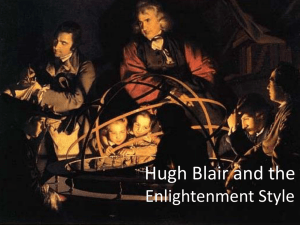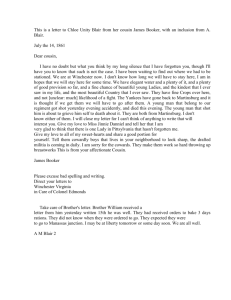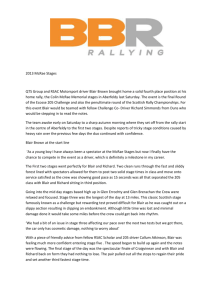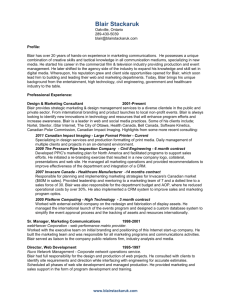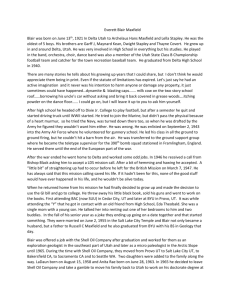ppt
advertisement
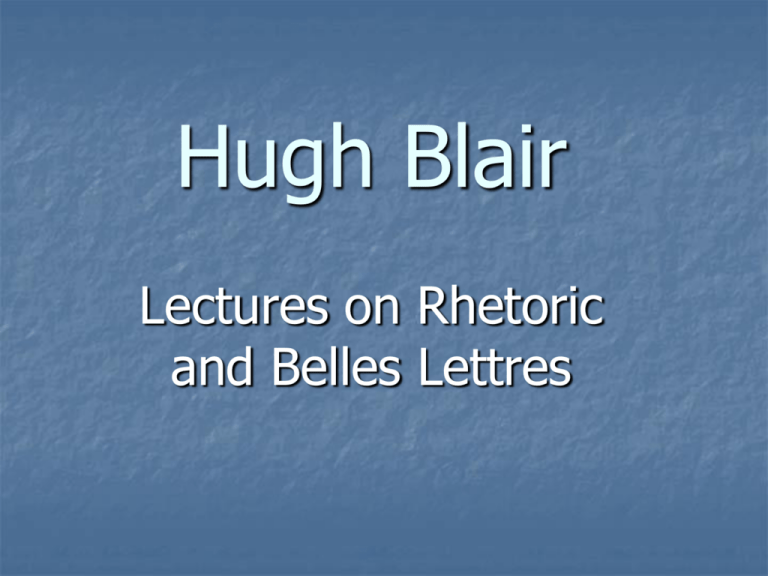
Hugh Blair
Lectures on Rhetoric
and Belles Lettres
Ethos (appeal to reputation, rhetor)
“Indeed, when the arts of
speech and writing are
mentioned, I am sensible
that prejudices against
them are apt to rise in
the minds of many. A
sort of art is immediately
thought of, that is
ostentatious and
deceitful; the studied
fallacies of rhetoric;
ornament substituted in
the room of use.” (p. 31)
{theory}
The voice of a rhetor is
viewed as pretentious
and insincere. Blair
realizes that to some,
rhetoric presents as an
empty show, lacking
substance and possessing
no useful value. The
passage intends to depict
Blair as humble,
understanding, and
gracious.
Ethos (continued)
“He must feel what a
good man feels, if he
expects greatly to
move, or to interest
mankind. They are
the ardent sentiments
of honour, virtue,
magnanimity, and
public spirit…” (p.36)
{theory}
Blair explains a rhetor
must possess noble,
admirable traits to
impact his fellow
man. Blair conveys to
his audience, by
outlining these worthy
traits, that he too,
possesses these
characteristics.
Ethos (continued)
“The foundation of all
good style, is good sense,
accompanied with a lively
imagination. The style
and thoughts of a writer
are so intimately
connected, that, as I
have several times
hinted, it is frequently
hard to distinguish them.
(p. 84) {theory}
A writer must think
sensibly while exhibiting
an animated imagination.
These attributes create
stylish prose. Blair
compliments the rhetor
for possessing these
gifted attributes, thus
complimenting and
elevating himself.
Ethos (continued)
“Whereas, what we
conceive clearly and feel
strongly, we shall
naturally express with
clearness and strength.”
(p. 84) {theory}
Blair believes when a
rhetor holds deep,
thoughtful insight, he will
convey his thoughts with
articulate, powerful
clarity. When the
audience feels conviction
and hears reason in a
rhetor’s words, they will
respect the moral fiber of
the speaker.
Ethos (continued)
“If the following Lectures have
any merit, it will consist in an
endeavour to substitute the
application of these principles
in the place of artificial and
scholastic rhetoric; in an
endeavour to explode false
ornament, to direct attention
more towards substance than
show, to recommend good
sense as the foundation of all
good composition, and
simplicity as essential to all
true ornament.” (p. 31)
{theory}
Blair comments on his
attempt to pour meaning,
rationale, and truth into
his Belles Lettres while
avoiding pontification and
elaborate prose (although
I think he failed). He
tells us that simplicity,
mixed with the above
qualities, creates rhetoric
of distinction. This
passage strives to show
Blair’s conviction to truth
and meaning in his
words.
Ethos (continued)
“…the study of Rhetoric
and Belles Lettres
supposes and requires a
proper acquaintance with
the rest of the liberal arts.
It embraces them all
within its circle, and
recommends them to the
highest regard.” (p. 31)
{theory and example}
Blair gives credence to
other arts such as poetry
and theater. His respect
for other crafts embodies
a noble, attentive man.
Ethos (continued)
“To speak or to write
perspicuously and
agreeably with purity,
with grace and strength,
are attainments of the
utmost consequence to
all who purpose, either by
speech or writing, to
address the public.” (p.
32) {theory}
Speaking and writing with
discernment, clarity, and
power should be the
aspiration of all rhetors.
Blair shows the high
standards of public
speakers.
Pathos (appeal to emotion,
audience)
“For, according as society
improves and flourishes, men
acquire more influence over
one another by means of
reasoning and discourse; and
in proportion as that influence
is felt to enlarge, it must
follow, as a natural
consequence, that they will
bestow more care upon the
methods of expressing their
conceptions with propriety and
eloquence.” (p.30) {theory and
example}
Blair addresses the
progression and success
of society to emphasize
the importance of
exemplary discourse in
society. Blair invites his
audience to understand
the relevance and affects
of rhetoric by relating it
to the success of society.
Pathos (continued)
“The public ears become
refined. It will nor easily
bear what is slovenly and
incorrect. Every author
must aspire to some
merit in expression, as
well as in sentiment, if he
would not incur the
danger of being
neglected and despised.”
(p. 33) {theory and
example}
Blair compliments the
audience for evolving
into critical, refined
listeners. This
passage shows Blair’s
sense of pandering to
his audience in
pursuit of creating
emotion.
Pathos (continued)
“True criticism is a liberal
and humane art. It is the
offspring of good sense
and refined taste. It aims
at acquiring a just
discernment of the real
merit of the authors.” (p.
34) {theory}
Blair pays tribute to the
true critic for deeply and
thoroughly pondering the
rhetor’s discourse. This
passage melds ethos and
pathos together because
Blair’s flattering, gracious
approach emanates good
character while offering
meaning to the reader
through reactionary
emotion.
Pathos (continued)
“Taste, as I before
explained it, is ultimately
founded on an internal
sense of beauty, which is
natural to men, and
which, in its application to
particular objects, is
capable of being guided
and enlightened by
reason.” (p. 44) {theory}
Men possess an innate
sense of beauty which
can be cultivated into
“taste”, the ultimate in
refinement. This is Blair’s
pompous way of
complimenting fellow
man’s naturally good
taste.
Pathos (continued)
“It is to the last degree
awkward and absurd…to
speak with elaborate
pomp of expression,
before persons who
comprehend nothing of it,
and who can only stare at
our unseasonable
magnificence.” (p. 86)
{theory}
Blair explains it is
wasteful and useless to
speak to less critical
thinkers who are unable
to comprehend a rhetor’s
“unseasonable
magnificence”. Blair may
evoke anger or smug
pride, but regardless, he
will evoke emotion which
will lead his audience to a
deeper perception of the
rhetor’s speech.
Style (presentation of
communication)
“Among nations in a
civilized state, no art
has been cultivated
with more care, than
that of language,
style, and
composition.” (p. 30)
{theory and example}
Style is likened to
civility using the
metaphor of
gardening to illustrate
the attention given to
the importance of
style.
Style (continued)
“We prefer a simple
and natural, to an
artificial and affected
style; a regular and
well-connected story,
to loose and scattered
narratives.” (p. 45)
{theory and example}
Synonyms and
antonyms are
contrasted to state
that the audience
prefers a clear style
and concise account,
so that our own
feelings will form our
discernment of taste.
Style (continued)
“It is not easy to give a precise
idea of what is meant by style.
The best definition I can give
of it, is, the peculiar manner in
which a man expresses his
conceptions, by means of
language. It is different from
mere language, or words. The
words which an author
employs, may be proper and
faultless; and his style may,
nevertheless, have great
faults: it may be dry, or stiff,
or feeble, or affected.” (p. 66)
{theory}
Blair can best define style by
giving the example that a
rhetor can choose the best
words and have impeccable
grammar, and still not be able
to communicate effectively or
persuasively. The rhetor with
great language skills can be
perceived as boring,
unintelligent or weak if his
style is lacking.
Style (continued)
“In giving the general
characters of style, it is
usual to talk of a nervous,
a feeble, or a spirited
style; which are plainly
the characters of a
writer’s manner of
thinking, as well as of
expressing himself: so
difficult it is to separate
these two things from
one another.” (p. 66)
{theory}
The rhetor’s style is
associated with their
feelings. People will have
a nervous style if they are
worried and an intense
style when they have
strong feelings about the
topic they are discussing.
Style (continued)
“Perspicuity, it will be
readily admitted, is the
fundamental quality of
style … this, therefore,
must be our first object,
to make our meaning
clearly and fully
understood, and
understood without the
least difficulty.” (p. 67)
{theory}
The most basic quality of
style is to be easily
understood. The rhetor
is counseled to strive for
that quality.
Style (continued)
“If we are obliged to
follow a writer with
much care, to pause,
and read over his
sentences a second
time, in order to
comprehend them
fully, he will never
please us long.” (p.
67) {theory}
A poor style will result
in the unpopularity of
the rhetor. (or, Blair
on Blair)
Style (continued)
“We are pleased with an
author…who frees us
from all fatigue of
searching for his
meaning; who carries us
through his subject
without any
embarrassment or
confusion; whose style
flows always like a limpid
stream, where we see to
the very bottom.” (p. 67)
{theory and example}
The importance of clarity
and flow is emphasized
when Blair uses simile to
illustrate good style by
comparing it to a flowing
stream where the stream
bed is clearly seen.
Style (continued)
“Style may be pure, that
is, it may all be strictly
English…and may,
nevertheless, be deficient
in propriety. The words
may be ill chosen; not
adapted to the subject,
nor fully expressive of the
author’s sense.” (p. 68)
{theory}
Blair considers a
language “pure” if it
hasn’t been influenced by
another language or
slang, but that doesn’t
assure perfect style if the
words are not appropriate
to the subject or don’t
convey the intended
message.
Style (continued)
The great source of a loose
style, in opposition to
precision, is the injudicious use
of those words termed
synonymous … the bulk of
writers are very apt to
confound them with each
other; and to employ them
carelessly … hence a certain
mist and indistinctness is
unwarily thrown over style.”
(p. 72) {theory and example}
Blair cautions against careless
use of confusing synonyms.
He uses the metaphor of mist
to illustrate how the rhetor’s
meaning will be obscured by
poor style.
Style (continued)
“A great branch of the
ornament of style, is,
figurative language …
some departure from
simplicity of
expression …
designed to render
the impression more
strong and vivid.” (p.
73) {theory}
Blair encourages use
of words which, when
put together, are not
meant to be
interpreted with their
literal meaning but
meant to introduce
another circumstance
to aid perception.
Style (continued)
“Tropes or figures contribute to
the beauty and grace of style.
First, they enrich language,
and render it more copious. …
Secondly, they bestow dignity
upon style. … Third, figures
give us the pleasure of
enjoying two objects presented
together to our view, without
confusion; … Fourth, they are
very properly said to illustrate
a subject, or to throw a light
upon it.” (p. 79-80) {theory
and example}
Using figurative language is
important because it makes
language more luxurious, adds
dignity to style, and allows the
listener to compare two
objects while clearly
understanding the subject.
Here he cites Aristotle, “we see
one thing in another, which is
always agreeable to the mind.”
Style (continued)
“The foundation of all
good style, is good
sense, accompanied
with a lively
imagination.” (p. 84)
{theory}
A rhetor having good
style is due to their
having common sense
combined with a good
imagination.
Style (continued)
“In order to form a
good style, the
frequent practice of
composing is
indispensably
necessary.” (p. 84)
{theory}
“Practice makes
perfect”, so style can
be improved if
composition is
carefully practiced.
Style (continued)
“There may be an
extreme, in too great and
anxious care about
words. We must not
retard the course of
thought, nor cool the
heat of imagination, by
pausing too long on every
word we employ.” (p. 85)
{theory and example}
Blair uses contrast to
counsel not to agonize
over every word to
prevent losing the train of
thought and enthusiasm.
He suggests completing
the work and letting time
pass for the best review
and correction.
Style (continued)
“We ought to render
ourselves well acquainted
with the style of the best
authors. This is requisite
both in order to form a
just taste in style, and to
supply us with a full stock
of words on every
subject.” (p. 85) {theory}
Study of the masters is
encouraged to appreciate
the differences in style
and to accumulate a large
vocabulary.
Style (continued)
“Attention to style
must not engross us
so much, as to
detract from a higher
degree of attention to
the thoughts.” (p. 86)
{theory}
The attention paid to
style must be
secondary to the
attention paid to the
subject.
Arrangement (how to structure)
“...in an endeavour to
explode false ornament,
to direct attention more
towards substance than
show, to recommend food
sense as the foundation
of all good composition,
and simplicity as essential
to all true ornament.”
(p31) {theory}
Though Blair seems
somewhat reluctant to
explicitly address
arrangement, he seems
to put value in several
instances upon simple
construction and a stigma
on florid arrangement.
Arrangement (continued)
“Everyone who has the
slightest acquaintance with
composition knows, that when
he expresses himself ill of any
subject, when his arrangement
is loose, and his sentences
become feeble, the defects of
his style can...be traced back
to his indistinct conception of
the subject...” (p33)
{example/theory}
It is impossible to hide behind
one's words and staging; for if
they are weak and
unconvincing, one's true
ignorance will surely be
revealed.
Arrangement (continued)
“The use and
importance of
precision can be
deduced from the
nature of the human
mind. It never can
view, clearly and
distinctly, above one
object at a time...”
(p69) {theory}
This statement and
the following
explication speak
again towards Blair's
call for clarity and
simplicity, in place of
ornament and filigree.
(personal note-Blair
would hate me)
Arrangement (continued)
“The great place which the
doctrine of tropes and figures
has occupied in systems of
rhetoric...and in ranging them
under different classes, has
often led persons to imagine ,
that if their composition was
well bespangled with a number
of these ornaments of speech,
it wanted no other beauty...”
(p75)
The near-sanctification of the
specific forms of figures and
tropes and their organization
does not necessarily speak to
their infallibility, and should not
be thrown about carelessly as
a crutch for weak “sentiment
or passion.”-(75)
Or as it might more please
Blair to say: just because
something is highly stratified
does not necessarily make it a
substitute for good writing.
Delivery (message transmission)
“Speech is the great
instrument by which man
becomes beneficial to
man: and it is to the
intercourse and
transmission of thought,
by means of speech, that
we are chiefly indebted
for the improvement of
thought itself.” (p. 30)
{theory}
The ability to transmit
messages makes people
helpful to each other in
that they can collectively
reason and improve their
understanding.
Delivery (continued)
“Writing and
discourse are objects
entitled to the highest
attention.” (p. 30)
{theory}
To communicate
effectively, the
methods of
transmission must be
carefully studied.
Delivery (continued)
“When we begin to
write or speak, we
ought previously to fix
in our minds a clear
conception of the end
to be aimed at.”
(p. 86) {theory}
Before transmitting a
message, the rhetor
needs to have a clear
understanding of
what they are going
to say and how they
will conclude their
message.
Logos (appeal to logic)
“Though rules and
instructions cannot do all
that is requisite, they
may, however, do much
that is of real use. They
cannot, it is true, inspire
genius; but they can
direct and assist it.” (p.
32) {theory}
Teaching does not cause
logical thought, but it can
guide and support it, just
as rules of speech do not
make a good orator, but
can help a person to be
one.
Logos (continued)
“Logical …
disquisitions move in
a higher
sphere…They point
out to man the
improvement of his
nature as an
intelligent being.” (p.
34) {theory}
The ability to
converse logically
indicates intelligence.
Logos (continued)
“Reflect first upon
that great law of our
nature, that exercise
is the chief source of
improvement in all
our faculties.” (p. 39)
{theory}
Practice of discourse
will improve the
rhetor’s ability. “Law
of nature” implies
logical thought.
Logos (continued)
“We are pleased,
through our natural
sense of beauty.
Reason shows us
why, and upon what
grounds, we are
pleased.” (p. 40)
{theory}
Senses give us
pleasure, but logical
thought determines
why and how we are
pleased.
Logos (continued)
“It is not in matters of
taste, as in questions
of mere reason,
where there is but
one conclusion that
can be true, and all
the rest are
erroneous.” (p. 43)
{theory}
For questions of logic,
there is one true
answer, and other
answers are false.
Taste, not being a
logical matter, does
not have an absolute
answer as to what is
tasteful.
Logos (continued)
“A standard properly
signifies, that which is
of such undoubted
authority as to be the
test of other things of
the same kind.”
(p. 44) {theory}
An authority is
logically held as a
means to measure
similar things. For
example, IBM set the
standard for early
personal computers,
as Dell does today.
Logos (continued)
“The conclusion,
which is sufficient for
us to rest upon, is,
that taste is far from
being an arbitrary
principle…Its
foundation is the
same in all human
minds.” (p. 46)
{theory}
Taste is based on the
perceptions of the
individual, but the
characteristic is
shared by all human
beings.
Logos (continued)
“In order to write
with precision, though
this be properly a
quality of style, one
must possess a very
considerable degree
of distinctness and
accuracy in his
manner of thinking.”
(p. 69) {theory}
One must be capable
of logical thought to
be able to write
concisely and
correctly.
Logos (continued)
“All science arises from
observations on practice.
Practice has always gone
before method and rule;
but method and rule have
afterwards improved and
perfected practice in
every art.” (p. 75)
{theory}
Rhetoric can be improved
by observing and
practicing, the
foundations of scientific
knowledge. The logic
which determines one
way of speech superior to
another will help make
proper language choices.
Invention (creation of knowledge)
“One of the most
distinguished
privileges...is the power
of communicating their
thoughts to one another.
Destitute of this power,
reason would be a
solitary, and in some
measure, an unavailable
principle.” [epistemology]
(p30) {theory}
One of the most
important faculties for
coming to knowledge is
through our
communication of ideas
effectively.
Invention (continued)
“...I am far from denying,
that rhetoric and criticism
have sometimes been so
managed as to tend to
the corruption of, rather
than to the improvement,
of good taste and true
eloquence.”
[epistemology] (p31)
{example}
There are many situations
where rhetoric has been
abused for the purpose of
misleading, and therefore
for leading the audience
away from truth, a “deepistemology,” if you will.
(Coining words, just
another violation of our
honored author's
maxims.)
Invention (continued)
“I by no means
pretend to say that
mere rhetorical rules,
how just soever, are
sufficient to form an
orator. ”[heuristics?]
(p32) {theory}
One cannot be taught
genius, and there are
therefore no specific
lessons or categories
of teaching which can
produce true
eloquence.
Invention (continued)
“When one only beginning his
acquaintance with works of
genius, the sentiment which
attends them is obscure and
confused. He cannot point out
the several excellencies or
blemishes of a performance
which he peruses; he is at a
loss on what to rest his
judgment: all that can be
expected is, that he should tell
in general whether he be
pleased or not.” (p39)
{example}
The novice student is not yet
well-versed enough in criticism
to be able to make an
articulate analysis of a work,
but like a child can only tell
whether it makes him feel
good or not.
Invention (continued)
(on forms of speech) “It is
this: [critics and rhetoricians]
remarked, that in them
consists much of the beauty
and the force of language; and
found them always to bear
some characters, or
distinguishing marks, by the
help of which they could
reduce them under separate
classes and heads.” [heuristics]
(p74) {theory}
Figures of language, though
wide in range and meaning, do
occur in recognizable patterns,
and these patterns were used
to align them under specific
categories.
Other
“Even in the deserts of America, where
human nature shows itself in its most
uncultivated state, the savages have
their ornaments of dress, their war
and death songs, their harangues and
their orators..." (p38) {example}
"In general, we may observe that in
the powers of and pleasures of taste,
there is a more remarkable inequality
among men than is usually found in
point of common sense, reason, and
judgment..." (p38) {theory}
"Every one must perceive, that among
rude and uncivilized nations, and
during the ages of ignorance and
darkness, any loose notions that are
entertained concerning such subjects,
carry no authority." (p45) {theory}
Blair exhibits a very assured sense of
ethnocentricity and makes a great
number of assumptions about taste,
intellect, and propriety which are not
necessarily agreed upon by the reader.
In its best state, he views other
uncultured peoples as savages with
only quaint rudiments of proper
society, but often he dips to outright
racism and pompousness.
**It should be noted in all of these
cases, that these are merely chosen
examples and do not include all
instances to be found.**
Other (continued)
"It is true, that these two qualities of
taste, delicacy and correctness,
mutually imply each other. No taste
can be exquisitely delicate without
being correct; nor can be thouroughly
correct without being delicate." (p41)
either-or fallacy
"I begin by observing, that if there be
no such thing as a standard of taste,
this consequence must immediately
follow, that all tastes are equally good;
a position which, though it may pass
unnoticed in slight matters, and when
we speak of the lesser differences
among the tastes of men, yet when
we apply it to the extremes, presently
shows its absurdity...” (p43) strawman/argument of extremes
Blair is also prone to fallacious
reasoning in several instances, which
is often probably attributable to his
prejudices; and that causes the reader
to question his authority on this
subject.
Other (continued)
“The introduction of foreign
and learned words, unless
where necessity requires them,
should always be avoided...At
present a multitude of Latin
words...have been poured
upon us. On occasion, they
give an appearance of
elevation and dignity to style."
(p68) {theory/example)
Some instances of Latin
passages in Blair's Lectures: pp
76, 83(2)
Also, several times Blair scoffs
at the practices of others, and
then commits the same
“errors” himself.
Conclusion
Although Dr. Hugh Blair lived over 250 years ago,
his belief that discourse was a powerful,
influential art still remains true today.
But:
Blair’s convoluted, ornate style often detracts from
his astute thoughts.
Was Blair a “magnificent” elitist, or does his
pontificating prose (our view) shed some light
on the demise of language in today’s society?
